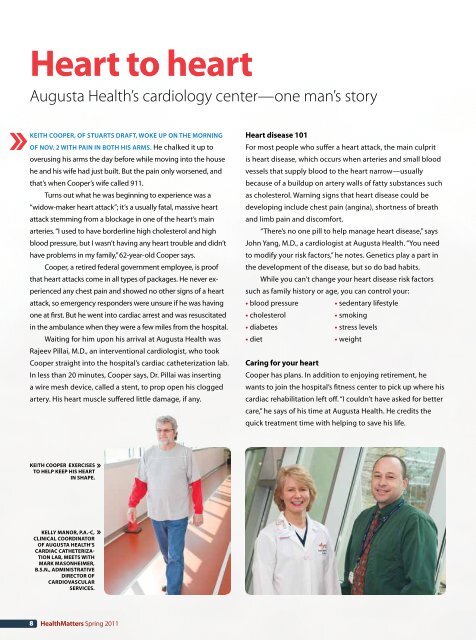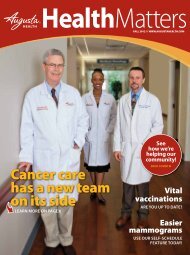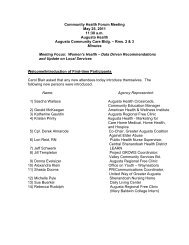You also want an ePaper? Increase the reach of your titles
YUMPU automatically turns print PDFs into web optimized ePapers that Google loves.
Heart to heart<br />
<strong>Augusta</strong> <strong>Health</strong>’s cardiology center—one man’s story<br />
keith cooper, of StuartS draft, woke up on the morning<br />
of nov. 2 with pain in both hiS armS. He chalked it up to<br />
overusing his arms the day before while moving into the house<br />
he and his wife had just built. But the pain only worsened, and<br />
that’s when Cooper’s wife called 911.<br />
Turns out what he was beginning to experience was a<br />
“widow-maker heart attack”; it’s a usually fatal, massive heart<br />
attack stemming from a blockage in one of the heart’s main<br />
arteries. “I used to have borderline high cholesterol and high<br />
blood pressure, but I wasn’t having any heart trouble and didn’t<br />
have problems in my family,” 62-year-old Cooper says.<br />
Cooper, a retired federal government employee, is proof<br />
that heart attacks come in all types of packages. He never experienced<br />
any chest pain and showed no other signs of a heart<br />
attack, so emergency responders were unsure if he was having<br />
one at fi rst. But he went into cardiac arrest and was resuscitated<br />
in the ambulance when they were a few miles from the hospital.<br />
Waiting for him upon his arrival at <strong>Augusta</strong> <strong>Health</strong> was<br />
rajeev Pillai, M.D., an interventional cardiologist, who took<br />
Cooper straight into the hospital’s cardiac catheterization lab.<br />
In less than 20 minutes, Cooper says, Dr. Pillai was inserting<br />
a wire mesh device, called a stent, to prop open his clogged<br />
artery. His heart muscle suff ered little damage, if any.<br />
keitH cOOPeR exeRcises<br />
tO HelP keeP His HeaRt<br />
in sHaPe.<br />
kellY ManOR, P.a.-c,<br />
clinical cOORDinatOR<br />
OF augusta HealtH’s<br />
caRDiac catHeteRizatiOn<br />
lab, Meets witH<br />
MaRk MasOnHeiMeR,<br />
b.s.n., aDMinistRative<br />
DiRectOR OF<br />
caRDiOvasculaR<br />
seRvices.<br />
8 <strong>Health</strong>Matters Spring 2011<br />
Heart disease 101<br />
For most people who suff er a heart attack, the main culprit<br />
is heart disease, which occurs when arteries and small blood<br />
vessels that supply blood to the heart narrow—usually<br />
because of a buildup on artery walls of fatty substances such<br />
as cholesterol. Warning signs that heart disease could be<br />
developing include chest pain (angina), shortness of breath<br />
and limb pain and discomfort.<br />
“There’s no one pill to help manage heart disease,” says<br />
John Yang, M.D., a cardiologist at <strong>Augusta</strong> <strong>Health</strong>. “You need<br />
to modify your risk factors,” he notes. genetics play a part in<br />
the development of the disease, but so do bad habits.<br />
While you can’t change your heart disease risk factors<br />
such as family history or age, you can control your:<br />
• blood pressure • sedentary lifestyle<br />
• cholesterol • smoking<br />
• diabetes • stress levels<br />
• diet • weight<br />
caring for your heart<br />
Cooper has plans. In addition to enjoying retirement, he<br />
wants to join the hospital’s fi tness center to pick up where his<br />
cardiac rehabilitation left off . “I couldn’t have asked for better<br />
care,” he says of his time at <strong>Augusta</strong> <strong>Health</strong>. He credits the<br />
quick treatment time with helping to save his life.





